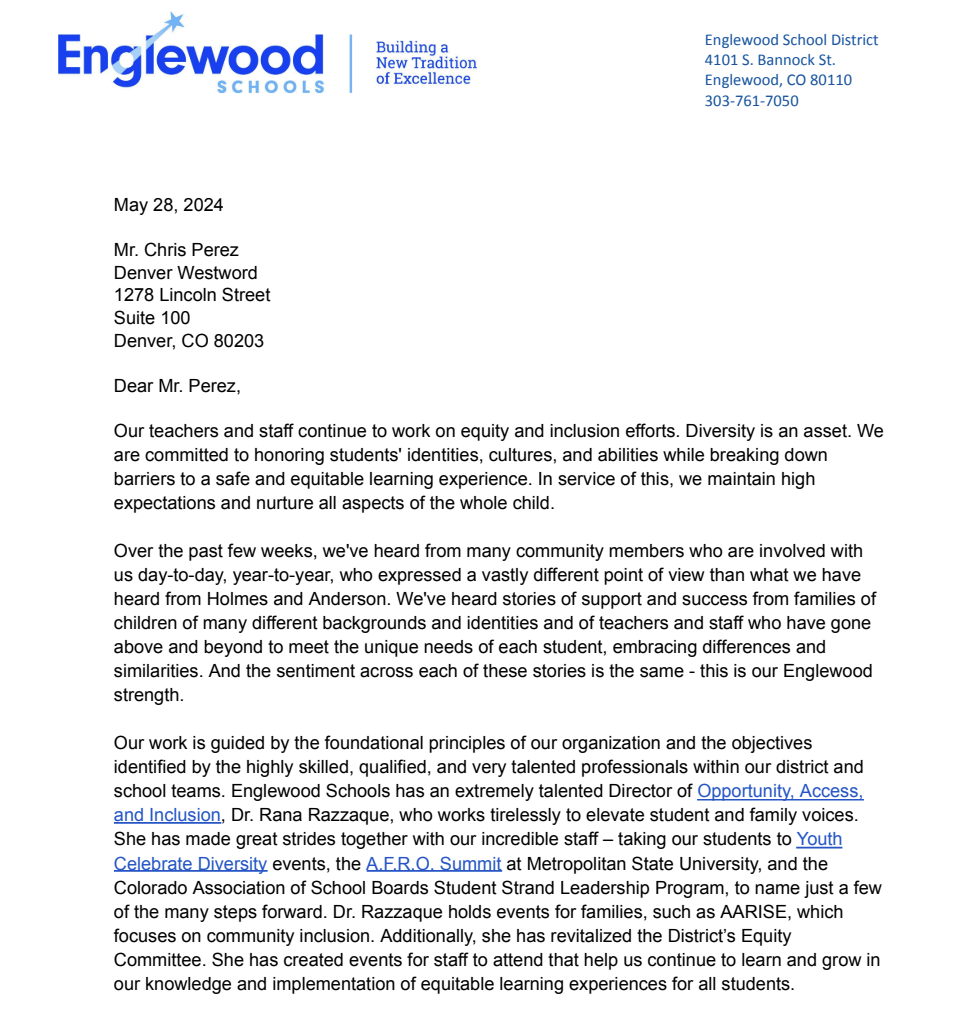
Englewood Board of Education

Audio By Carbonatix
Englewood Board of Education member Davon Williams, a two-time convicted felon currently facing an auto theft charge from 2019, knows what people think about him.
“I’m not a criminal,” he tells Westword.
“I’m trying to change the narrative behind myself. There’s other facets to me. I’m not the person people think because of the media attention.”
Williams, 34, ran unopposed last year to become secretary of the Englewood Schools Board of Education. And the New York native has a lot to say regarding his short but eventful time as the district’s only Black boardmember over the past seven months.
In addition to being called out in media reports for his criminal past, Williams made headlines in March for a mileage reimbursement dispute; his fellow boardmembers voted against giving Williams $140 in district funds for traveling and attending events with state officials, citing budget cuts and overspending.
“It made me feel isolated,” he says of the decision. “We pretty much carry votes [together] as a board, so it felt like that was the first kind of tear.”
Williams found himself in the Englewood spotlight again this month after Auon’tai Anderson, CEO of the Center for Advancing Black Excellence in Education and former Denver School Board vice president, and MiDian Holmes, CEO of the Epitome of Black Excellence & Partnership, mentioned his situation in their first Green Book Initiative report.
The new Initiative is a scoring system that Anderson and Holmes launched for Colorado schools that calculates whether a “nurturing atmosphere” is provided for Black students, educators and school board members. In the first Green Book report, the Englewood School Board was given “Exodus Status” – the worst possible rating – for the treatment of Williams during the mileage reimbursement debacle, among other things.
“I appreciate the leaders in this space and the historic context of the initiative,” Williams says. “I’m always of the opinion that the conversation needs to not be so white-focused given the fact that our populace is more than half minority students.”
To Williams, “cultural competency” is imperative, and it’s lacking within Englewood Schools. “I think once people understand that, they’ll be able to understand the ways that they can connect better with the community at large,” he says.
Williams feels there’s “room for growth within the district,” despite what others may think. “Just like every district, I’m not going to say that we are perfect, by any means,” he says. “There is always improvement that needs to be made. Small steps lead to bigger steps.”
One of those needed steps, according to Williams, is seeing more diversity at the top.
“I would love more boardmembers of color across the board,” he says.

Davon Williams is currently the only Black member on Englewood’s Board of Education.
Englewood Board of Education
Williams, who moved to Colorado in 1998 with his family, says he often feels uncomfortable sharing ideas and concerns with his fellow boardmembers.
“Because I’m a member of the [Colorado Black Caucus of School Board Directors], I frequently interact with other Black elected officials in similar positions, which is how I’m able to effectively do my job,” he says. “There’s some times, being a new member, that I don’t necessarily feel comfortable going to other boardmembers and asking them questions that I feel more comfortable asking my caucus.”
He believes that diversity and representation on a school board are “extremely important” when governing a student population that is largely non-white.
Out of the nearly 2,400 students enrolled in Englewood Schools during the 2023-2024 school year, 4.8 percent identified as Black, according to the Department of Education. A little over 42 percent identified as Hispanic and 46 percent identified as white, while 5.4 percent identified as two or more races, fewer than 1 percent identified as Asian, and fewer than 1 percent identified as American Indian or Alaska Native.
“I think it’s critically important that districts are culturally competent,” Williams reiterates. “Sometimes it feels like the conversations are not focused on that equity.”
During his reimbursement saga, Williams says he “knew” the vote would “probably not” go his way given conversations with other boardmembers and his request being put on the board’s agenda. Still, he felt the need to get his situation out in the open.
“I also felt as though it was worth having the conversation in public, because a lot of these conversations surrounding reimbursement and boards are not held in public,” Williams says. “So I welcomed the transparency.”
Despite having around three and a half years left on his term, Williams says he doesn’t plan to ask for reimbursement of mileage ever again, regardless of how far he has to travel for something.
“I’m supposed to be driving to Pueblo in October because I’m a [Colorado Association of School Boards] Delegate Assembly representative,” Williams says. “That’s where the conference is. But I’m still not asking for miles because of the backlash.”
Williams insists he was “just following established policy” when he asked for reimbursement from the board in January. Under the same policy, boardmembers had taken reimbursements in December “as a full board without conversation,” he says.
“The policy is in place and has been since 1977,” he adds. “I thought that I was doing what was in the policy. And I’ve since realized that what’s best for me is to just not do [reimbursements] anymore. My companies are just fine.”
While controversies have continued to come his way, Williams says he wants people to know he’s a much different person than what’s been depicted in the media. He points to past Westword articles from 2013, 2014 and 2015 – where he is described as a businessman, fashion designer, DJ and entrepreneur – as examples of who he actually is.
“My businesses have expanded to include real estate ventures,” he says. “I’m also an investor in a couple of localized businesses.”
Williams’s criminal past dates back to 2012, when he committed aggravated motor vehicle theft in Denver – buying a 2006 Porsche Cayenne with a bounced check, according to prosecutors. He committed felony theft in 2013 and wound up getting probation for that conviction and his 2012 charge, which was revoked in 2017, leading to a pair of ninety-day jail sentences, served concurrently. Appeals were filed but dismissed in both cases.
“I’ve done a lot of work since I went to jail,” Williams says. “I’m not the same person.”
The 2019 auto theft case Williams is currently dealing with stems from an allegation of aggravated motor vehicle theft in the second degree by an individual who purchased a car from Williams and asked him to fix it after the vehicle broke down. Williams is accused of towing the car to a shop and telling the person he’d keep and buy it back before ceasing contact, according to police.
The case, which is being prosecuted by Adams County, has been postponed four times but is scheduled to have an arraignment on July 2. If Williams goes to trial and is convicted, he could be removed from the Englewood school board under a Colorado law stating that a school office shall be vacated if a person who is duly elected or appointed is found guilty of a felony.
Westword reached out to Englewood Schools and its Board of Education for comment on Williams’s statements, prompting the district to send a letter addressing its Green Book Exodus Status and ways it’s working on equity and inclusion efforts – but the document doesn’t mention Williams specifically.
“Over the past few weeks, we’ve heard from many community members who are involved with us day-to-day, year-to-year, who expressed a vastly different point of view than what we have heard from Holmes and Anderson,” the letter says. “We’ve heard stories of support and success from families of children of many different backgrounds and identities and of teachers and staff who have gone above and beyond to meet the unique needs of each student, embracing differences and similarities. And the sentiment across each of these stories is the same – this is our Englewood strength.”
The letter adds, “Our dedication is unwavering in maintaining excellence in the school experience for our students and preserving the community connectedness you feel when you walk into our schools. Our work is not finished in this area – nor likely will it ever be. We know that there are systemic factors that perpetuate educational disparities for students of color. Every day, our district-wide focus on educational equity galvanizes our staff to continue to ensure opportunity, access, and inclusion for every child.”
Holmes says it’s telling that Englewood Schools didn’t address Williams directly in that letter.
“This sounds like they are willing to believe those who affirm them, yet unwilling to listen to those who don’t,” Holmes says. “I would challenge them to understand that when someone works with you day to day, year to year, there likely is some sort of power dynamic they don’t want to acknowledge. It takes a lot of courage for someone to stand up and say, ‘We are not doing this right.’ Especially in an environment that Englewood has seemingly created.”

Englewood Schools Board of Education president Katie Wilberding Cross and superintendent Joanna Polzin both signed the letter sent to Westword.
Westword